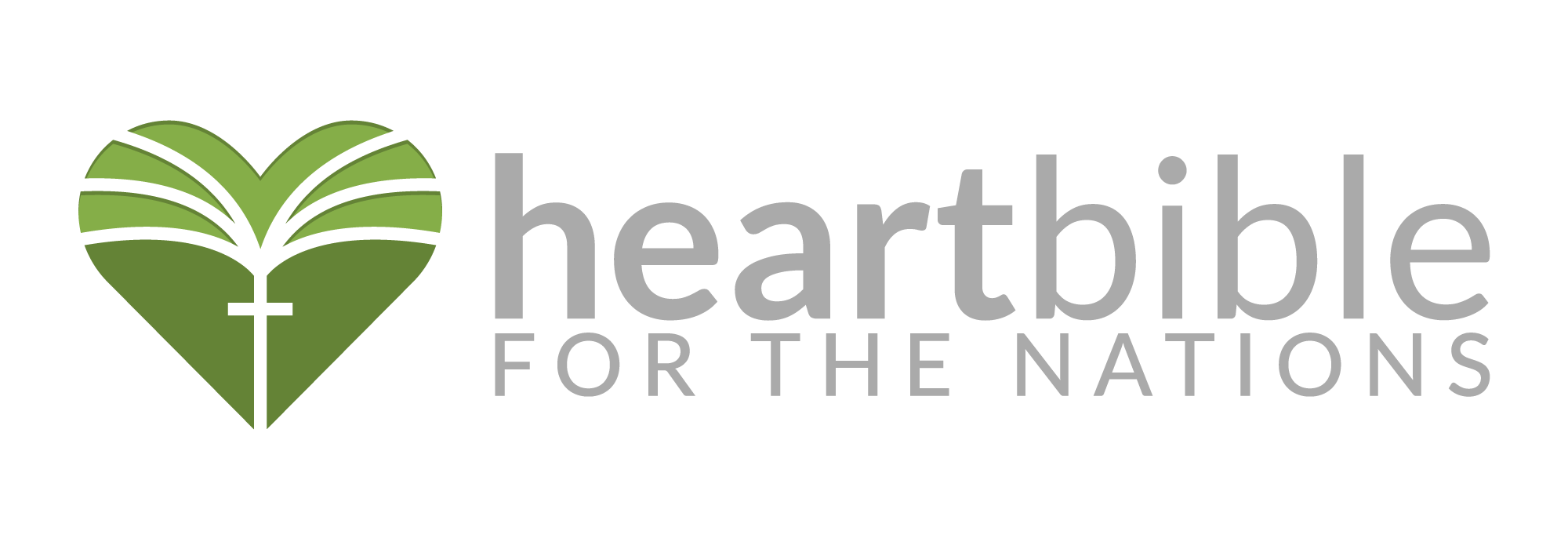What is Heart Bible all about?
We want to write the Bible on the hearts of every tribe, tongue, and nation.
Core Values and Convictions
- The Word of God is our bread of life. Therefore, we believe it is necessary to meditate on God’s Word and that it abides within us to nourish the soul. (Deuteronomy 8:3; Joshua 1:8; Matthew 4:4; Col. 3:16)
- One cannot really know a passage of Scripture unless they can restate it in their own words. (Deuteronomy 30:11–14)
- It is necessary to equip others to rightly handle the Word of Truth. Therefore, we don’t add or subtract important details when we tell Bible stories. Nor do we combine other passages into a composite story. (2 Timothy 2:15)
- Internalizing a Bible story in order to restate it naturally in one’s own words is essentially the discipline of meditation and Bible study. (Joshua 1:8)
- The discipline of telling Bible stories is highly effective for evangelism, discipleship, equipping leaders and planting churches. (2 Tim. 2:2)
- It’s usually preferable to allow students of the Bible to discover what God is saying through key questions of understanding and application.
- Parables, stories and figures of speech communicate abstract truth effectively. It is how Jesus taught. (Matthew 13:3, 33–34)
- The practice of learning, telling and teaching Bible stories makes God’s Word more accessible to more people, including those who can’t read or write. (Acts 4:13)
- The written Bible is the Word of God and we are completely dependent upon it. If we neglect to put God’s Word on our hearts and in our mouths, we become spiritually weak and ineffective witnesses of Jesus Christ. (Deut. 30:11–14)
- It is necessary to tell Bible stories without commentary or explanations so that the hearer receives an oral Bible they can then pass on to others. (2 Tim. 1:13–14; Rev. 22:18–19)
- The Bible should not be used as merely a reference book but that we must hide it in our hearts. (Psalm 119:11)
- The stories of the Bible are meant to be told (not just read, studied and discussed) because in doing so they proclaim the good news of God’s active presence in our world.
- The discipline of growing a heart Bible has the potential of turning the world upside down for Christ. (Acts 5:28; 17:6).
- If we do not tell God’s stories, but leave them as print on the pages of the Bible, our silence tells the world they aren’t important. (Romans 1:16) The Word of God speaks for itself and is to be prominent above any interpretation or application of it.
- We believe the stories of the Bible speak for themselves and so we should be careful not to consider our interpretations of them as more important.
Our Trainings
Our trainings takes place in four modules. Each module is 15 hours and generally takes two and a half days to complete.
First Module “Gateway” – What is a Heart Bible and why is it important?
We learn the meaning and value of growing a heart Bible as a spiritual discipline. We discover how to learn, tell and teach simple Bible stories. After the training the participants will be required to learn, tell and teach a series of six stories from the Book of Mark in order to receive a certificate and continue in training with HBN.
Second Module “Evangelism” – How do we evangelize using Bible stories?
We learn how to use Bible stories as a bridge to the good news. We practice with 15 Bible stories as examples. This module involves an evangelism outreach activity during the training.
Third Module “The Big Story” – How do we grow a Heart Bible for the Nations?
We learn, tell and teach more difficult Bible stories.. After the training the participants will be required to learn, tell and teach a series of twenty-two stories from Genesis to the Ascension of Jesus in order to receive a certificate and continue with HBN training.
Fourth Module “The Power of God’s Stories” – How do we study Bible stories for preaching and teaching?
We learn principles and tools for studying narratives in order to discover their theological themes for the purpose of preaching and teaching.
The history of Heart Bible for the Nations
While raising their three sons, Equipping Evangelist had been serving in pastoral roles for 13 years, and his wife worked as an RN. They started their missionary career by planting 3 Hispanic churches in the Chicago Suburbs. After their sons were married, EE began to train pastors in Central America, focusing on preaching expository sermons.
Although they felt the Lord wanted them to serve together, they didn’t know how his wife would serve, since she didn’t have formal seminary training. At the same time, it became clear that many of the pastors EE was teaching had minimal education and the literate-style methods he was using seemed out of reach for them.
Then the Lord brought them to a Missions’ Conference in the US, where they were exposed to the concept of Orality and Chronological Bible Storytelling in Missions. Sensing that this could be a solution to both dilemmas, they attended various training workshops and adapted what they had learned to their own teaching contexts. Immediately, they saw how they could both teach and how participants could learn, tell and teach very effectively using the narratives of the Bible.
After time and experience, it was clear that the Lord had not only shown them a wonderful tool for evangelism and discipleship, but also a way to build their own knowledge of the Bible and deepen their faith.
Thus, the concept of “growing a Heart Bible” was conceived, and finally, after years of use in local and international ministries, Heart Bible for the Nations was born.
The first “Heart Bible church” sprang up in Venezuela in 2022, and today, there are more than 50 Heart Bible churches, ministries and schools around the world.

